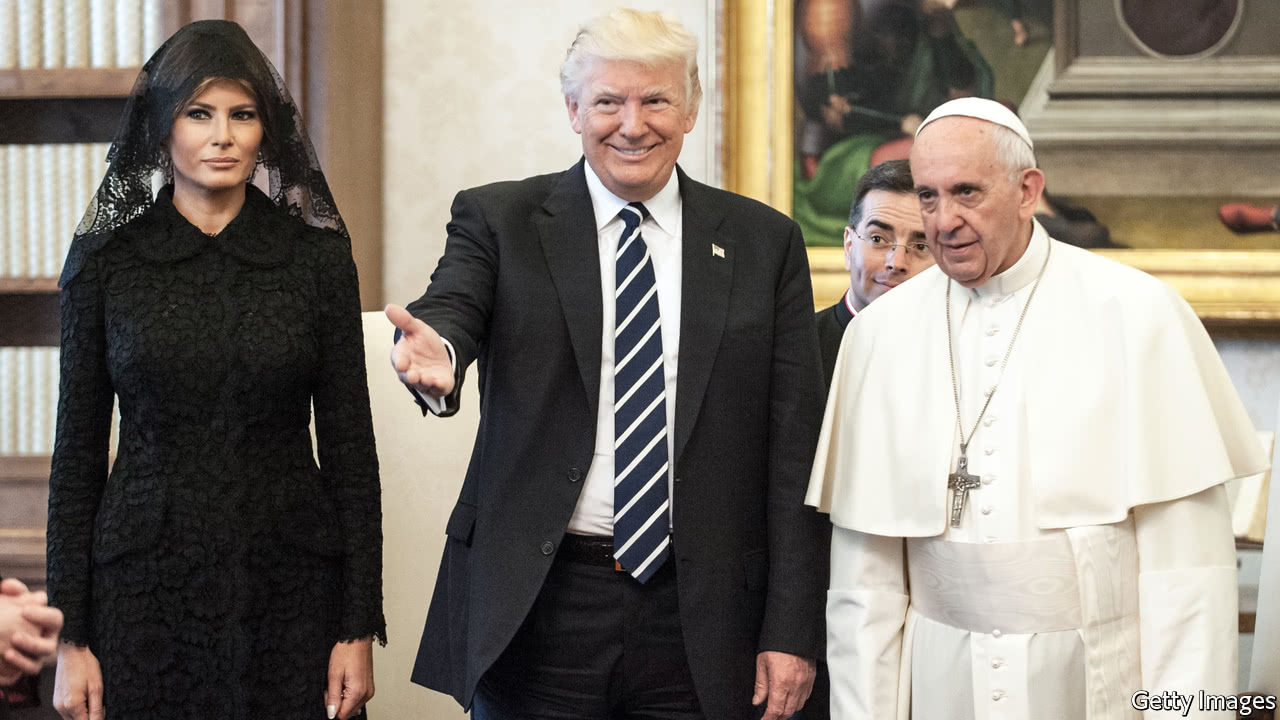
WHEN Donald Trump laid into the bishop of Rome during his electoral campaign, some in America—where Catholics represent around a quarter of all voters—wondered whether it would cost him the presidency. The pope had chided Mr Trump for his plan to build a wall on the border with Mexico—it was “not Christian”, the pontiff said—and Mr Trump responded with characteristic imprudence. The pope, he said, was “disgraceful”.
But on May 24th, during a meeting with the pope in Vatican City, Mr Trump was on his best behaviour. He described the half-hour meeting, in the pope’s private office, as “great” and “fantastic.” A brief Vatican statement described it as “cordial” and expressed hope for collaboration with the administration on “health care, education and assistance to immigrants”.
That looks unlikely. Pope Francis and Mr Trump hold wholly different views on those and indeed most important topics. On a handful of issues they clash frequently. The plight of migrants is one of Pope Francis’s main concerns; one of the president’s first official acts was to sign an order blocking Syrian refugees from entering America. Pope Francis is an ardent environmentalist and in 2015 became the first pope to devote an entire encyclical to the environment and climate change; the president has said he may not uphold the Paris climate-change agreement. And the pope is unusual even among religious leaders for the emphasis he puts on fighting poverty. The day before he met Pope Francis, Mr Trump’s administration unveiled a budget that would slash spending on programmes that help some of America’s poorest people. The pope, who has called arms sales “the industry of death” presumably also disapproves of the multi-billion dollar defence deal Mr Trump sealed last week with Saudi Arabia.
More superficially perhaps, the pope, who has called money “the devil’s dung”, values modesty; Mr Trump does not. In 2013, on his first day as bishop of Rome, the Pope made headlines by paying a hotel bill himself, which earned him an admonishment from Mr Trump. “I don’t like seeing the pope standing at the checkout counter of a hotel in order to pay his bill”, he tweeted. “It’s not Pope-like!”
It was not surprising, then, that at their meeting in Rome, the pope and the president mostly stuck to relatively safe topics, according to the Vatican statement: their “joint commitment in favour of life” (despite his liberal tone on many other topics, the pope opposes abortion), religious freedom and the persecution of Christians in the Middle East.
It was, after all, important for Mr Trump that the meeting went well. As he battles a mounting crisis at home, the president must have hoped that a little of the pope’s moral authority would seem to rub off on him. Ever since the presidency of Dwight Eisenhower every American leader has met the pontiff, with great fanfare, and dispatched a Catholic bigwig to be ambassador to the Holy See: Mr Trump has chosen Callista Gingrich, the current wife of Newt Gingrich, a serially divorced former Speaker of the House. Sometimes the relationship between pope and president has been significant: Ronald Reagan saw Pope John Paul II, a Pole, as an important ally in the fight against against communism.
The meeting was important for Mr Trump for another reason too. The support of America’s Catholics was critical in a tight election. After Barack Obama carried the Catholic vote in 2008 and 2012, 52% of Catholics voted for Mr Trump and 45% for Hillary Clinton in 2016. Mr Trump must hope that his meeting with the pope will improve his standing with them, because his popularity has since fallen to historic lows. Among Hispanic Catholics, only a quarter of whom voted for Mr Trump, his approval rating is around 15%. Meanwhile American Catholics, even the conservative sorts that disagree with him on much, continue to love the pope: 87% view him positively.
Of course, the pope may have hoped to influence Mr Trump too. He is a political pontiff: during the Obama administration he helped to bring about talks between America and Cuba.
Towards the end of their meeting the two men exchanged gifts. Mr Trump gave the pope a first-edition set of books by Martin Luther King junior. The pope’s gifts were a bit more pointed. They included a medal with an olive branch and copies of his own writings, including Evangelii gaudium, in which he denounces many aspects of free-market economics; and Laudato Si, his opus on climate change, in which he chastises sceptics and their “denial”.
“Well, I’ll be reading them,” said Mr Trump.
No hay comentarios.:
Publicar un comentario